
The cost of self-reliance
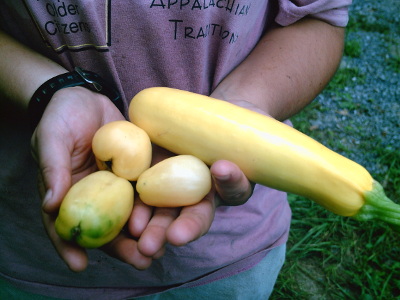 Good afternoon, sweet Anna!
Good afternoon, sweet Anna!I've recently been mulling over the costs of homesteading (or whatever else people choose to call it) and thought it would be wise to ask you what you think.
Purchasing land and home aside, what are the the bank account costs of establishing a garden that can feed two people with the methods that you use? Even if you buy the land outright and the home is free, or also bought outright, there are still repairs that will have to be made over time, is there a way to guess a general amount per year for that? How much to maintain soil, gardening equipment? Seed preservation, food storage, and livestock if one keeps the smaller, more cost-effective animals?
You guys have been making great strides on the farm improvements by utilizing your helpful assistant lately, what do those sorts of costs look like? Obviously much of what you can explain are only guesses or your own costs, but what are some good methods for keeping track of costs once we begin on our own journey on the land?
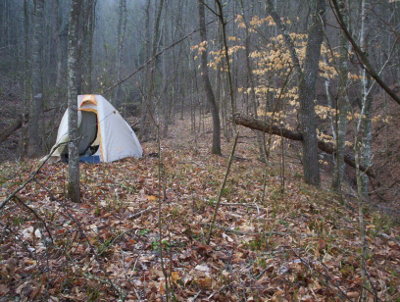 I suppose what I'm asking is:
how much does it cost to maintain and how much does it cost to improve
over time? I think that some of us who are hoping to go back to
the land would like to know how much to plan for. We need to
know, generally of course, how to determine the money we would need to
tuck away, invest, or what level of income to maintain so that our
lives can function while we find our balance, then how much it will
take to cruise right along.
I suppose what I'm asking is:
how much does it cost to maintain and how much does it cost to improve
over time? I think that some of us who are hoping to go back to
the land would like to know how much to plan for. We need to
know, generally of course, how to determine the money we would need to
tuck away, invest, or what level of income to maintain so that our
lives can function while we find our balance, then how much it will
take to cruise right along.Most people --- okay, maybe just me --- don't have any idea how to plan for food. I don't know how much salad I eat, if I'll need potatoes, if I can really stomach that much zucchini, etc. And worse, I'm worried that even if I calculate enough, that what I grow won't make it. Every year is an experiment, surely, but how can you figure in the cost of having to go to the store anyway because of crop failure, etc?
Is this all just too BIG a question? Is it simply too much to answer? I don't know who else I can ask.
Thank you so much for all you do,
Brandy
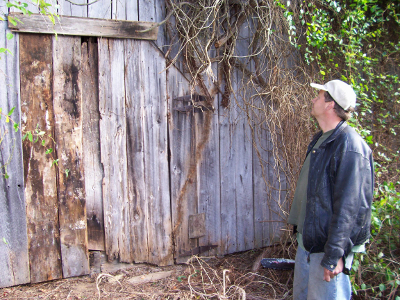 I've been receiving a lot of
thought-provoking reader questions like this via email lately, but
there are always so many other things to post about that I never seem
to get around to answering them. There's no time like the present
to start, though, and I thought Brandy's question might be something
that other readers would like to chime in on. (Plus, with a
salutation like that, how could I not make this the first reader
question post of the summer?)
I've been receiving a lot of
thought-provoking reader questions like this via email lately, but
there are always so many other things to post about that I never seem
to get around to answering them. There's no time like the present
to start, though, and I thought Brandy's question might be something
that other readers would like to chime in on. (Plus, with a
salutation like that, how could I not make this the first reader
question post of the summer?)
While I think we should
all talk about money more, this is a tough question to answer because
everyone will spend a different amount of cash on their
homestead. Mark and I believe strongly in paying as we go, which
means that in the early years on the homestead, we spent next to
nothing on the garden and improvements. Our combined annual
income was $12,000 at the time, so we simply couldn't afford any excess.
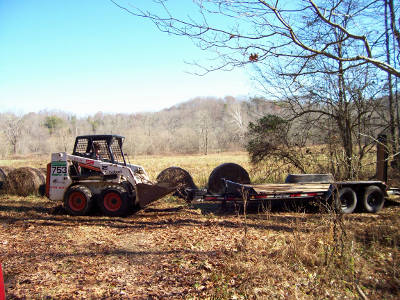 That said, I had been saving
ever since high school, so I had enough of a nest egg to pay some hefty
startup fees. It cost $1,266 for our electric hookup and we paid
another $2,000 to move our free
trailer onto the land. Mark and I were just barely dating at
the time, so I paid off his debts in exchange for labor before we
pooled our incomes and started going steady. As a result, we went
into the endeavor debt-free, except for a no-interest,
pay-when-you-feel-like-it loan from a very good friend to buy the land.
That said, I had been saving
ever since high school, so I had enough of a nest egg to pay some hefty
startup fees. It cost $1,266 for our electric hookup and we paid
another $2,000 to move our free
trailer onto the land. Mark and I were just barely dating at
the time, so I paid off his debts in exchange for labor before we
pooled our incomes and started going steady. As a result, we went
into the endeavor debt-free, except for a no-interest,
pay-when-you-feel-like-it loan from a very good friend to buy the land.
During our first two
years on the farm, I budgeted $100 for seeds each year, and if I could
drum up the cash, spent another $50 or so on perennials, but we didn't
add any other storebought inputs. Many of our first perennials
were gifts from friends --- our family's heirloom Egyptian onions have
now spread across the U.S., and a friend's gift of two varieties of
strawberry plants have fed us bushels of berries while also allowing me
to give away starts to my family and friends. We started
our grapes by taking hardwood cuttings from a friend's orchard, and
our huge ever-bearing raspberry patch started as a single plant that
came as a freebie with our order of fruit trees. The theme here
is that if you understand how to propagate plants and save seeds (and
are patient), you can get the plant side of your farm going with very
little cash.
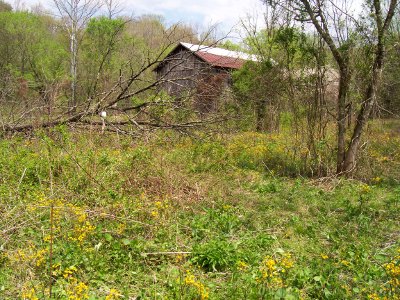 Our first chickens were a
partnership with a neighbor who wanted fresh eggs but didn't want to
put the time into building chicken tractors and taking care of the
livestock. He paid for the birds and we only had to buy chicken
feed, giving him some eggs in the early years. That said, chicken
feed isn't cheap, so poultry care made up a large proportion of our
early farm costs ($262 in 2008, before we gave away some of the 20
birds we started with).
Our first chickens were a
partnership with a neighbor who wanted fresh eggs but didn't want to
put the time into building chicken tractors and taking care of the
livestock. He paid for the birds and we only had to buy chicken
feed, giving him some eggs in the early years. That said, chicken
feed isn't cheap, so poultry care made up a large proportion of our
early farm costs ($262 in 2008, before we gave away some of the 20
birds we started with).
Meanwhile, we turned the
trailer from a windowless, throwaway item into a living space using
free building materials my mother found on the curb on trash day and
that we picked up at a giveaway of a service organization that builds
houses. We did splurge a hundred dollars or so to get new
double-glazed windows, which had been custom-made but not picked up, so
were vastly reduced in price. Tools were the 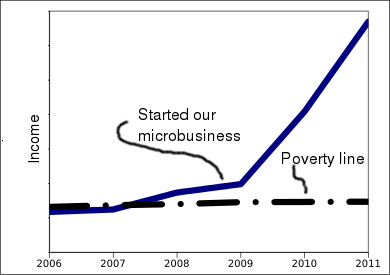 expensive
part, but my father found a lot of hand tools for me at an auction and
Mark's mother gifted us with many power tools. (The December
volume of Weekend Homesteader covers the tools that I consider the
bare essentials for homesteading.)
expensive
part, but my father found a lot of hand tools for me at an auction and
Mark's mother gifted us with many power tools. (The December
volume of Weekend Homesteader covers the tools that I consider the
bare essentials for homesteading.)
While this sounds like
hard-scrabble living (and it was in certain ways), we also had the
freedom to invest our time in breaking free of the rat race and
figuring out where our passions lay. Since we weren't saddled
with debt, we were able to tighten our belts and start our microbusiness, finally rising above the
poverty line. More recently, income from my writing has added to
the coffers, which means we suddenly have plenty of extra cash to throw
at homesteading projects.
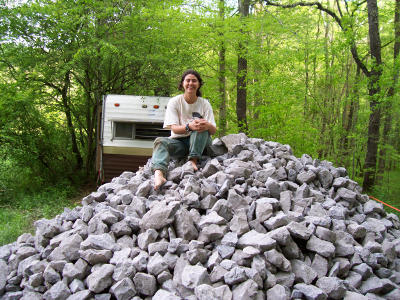 As
our income has increased, we've put more and more money into the
farm. We spent nearly $900 on each of our efficient
wood stoves (getting
some of that back in taxes), which lowered our heating bill and finally
allowed me to stop wearing a winter coat inside. The
East Wing cost us another $1,100, and more recently we spent
$4,000 on the barn roof and have paid Bradley around $3,000 this summer
for lots of projects (only some of which you've seen on the blog) along
with perhaps that much again for his building supplies.
As
our income has increased, we've put more and more money into the
farm. We spent nearly $900 on each of our efficient
wood stoves (getting
some of that back in taxes), which lowered our heating bill and finally
allowed me to stop wearing a winter coat inside. The
East Wing cost us another $1,100, and more recently we spent
$4,000 on the barn roof and have paid Bradley around $3,000 this summer
for lots of projects (only some of which you've seen on the blog) along
with perhaps that much again for his building supplies.
Lately, we've been
investing lots of cash in straw and cover crop seeds --- Mark talked me
into splurging $80 this summer on 20 pounds of oilseed radishes to
really boost the farm's fertility and we've also spent $650 in the last
year on straw. And, as you've probably noticed, we've been
devoting more cash to perennials that are experimental, half of which
fail to thrive in our climate, but others of which have found a niche
on our farm.
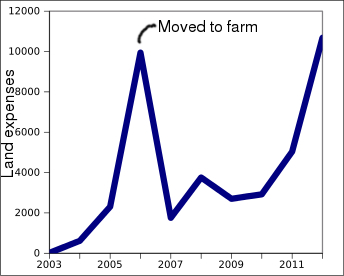 I keep track whenever money
goes in or out of our pockets using the free program GnuCash. It
reports that we've spent just shy of $40,000 on the farm since 2003,
which you should take with a grain of salt --- I'm not as careful to
make sure that everything is categorized correctly in our non-business
accounting. But you can get an idea for annual costs, ranging
from that expensive startup year, through the years when we were barely
getting by, and finally to our push in the last year to invest in our
homestead.
I keep track whenever money
goes in or out of our pockets using the free program GnuCash. It
reports that we've spent just shy of $40,000 on the farm since 2003,
which you should take with a grain of salt --- I'm not as careful to
make sure that everything is categorized correctly in our non-business
accounting. But you can get an idea for annual costs, ranging
from that expensive startup year, through the years when we were barely
getting by, and finally to our push in the last year to invest in our
homestead.
So, the take-home
message is --- assuming you don't go into debt to get started, your
annual costs could be as low as $2,000 to $3,000 per year to run a two
person homestead. However, that assumes you're willing to do
without and pinch pennies (much easier if you start with nothing and
slowly build up your infrastructure than if you move from a fancy place
in the city and are shocked to live without running water for the first
few years).
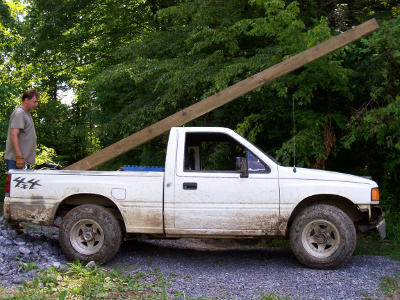 The
one ongoing expense you can't get away from is property taxes, which
is why I highly recommend buying cheap land and living below your
means. We purchased subpar swamp and hillside in a
poverty-stricken region of Appalachia for $600 per acre, and even
though property taxes have risen considerably in the last eight years,
we only paid $321 in county taxes in 2011.
The
one ongoing expense you can't get away from is property taxes, which
is why I highly recommend buying cheap land and living below your
means. We purchased subpar swamp and hillside in a
poverty-stricken region of Appalachia for $600 per acre, and even
though property taxes have risen considerably in the last eight years,
we only paid $321 in county taxes in 2011.
I hope that helps you
get a handle on the financial side of homesteading. I didn't
cover all of your questions in depth since it's hard to put
a cash price on the value of the produce we grow (although I did mean to add
that I think any reasonably interested person can grow all of their own
vegetables as long as they diversify enough that if one crop fails,
they can eat something else). Maybe others will chime in with
their answers to Brandy's question?
(By the way, all of
these photos are from when Mark and I were courting, before we moved to
the farm. And, as a postscript to the many people who have
emailed questions I haven't yet answered --- don't worry, you're still
on my list!)
Want more in-depth information? Browse through our books.
Or explore more posts by date or by subject.
About us: Anna Hess and Mark Hamilton spent over a decade living self-sufficiently in the mountains of Virginia before moving north to start over from scratch in the foothills of Ohio. They've experimented with permaculture, no-till gardening, trailersteading, home-based microbusinesses and much more, writing about their adventures in both blogs and books.
Want to be notified when new comments are posted on this page? Click on the RSS button after you add a comment to subscribe to the comment feed, or simply check the box beside "email replies to me" while writing your comment.

Keeping track of food you do eat now is a good first step to knowing how much to grow. It is not something we do as a society anymore, we just go to the store and buy what we need with no thought of the actual food grown. When I first started my garden, I grew for fun and flavor. In subsequent years, I kept track of that produce, again, just for fun. A few more years in, I kept track of all the produce we consumed in a year - what I grew, what we bought, what I foraged, what we were gifted. It was startling and eye-opening to really see how much food we consumed! However, it did give me a starting point to think about how much food I would need to grow and/or preserve for two people.
That is my 2 cents on the topic!
Adrianne, as usual, brings some very implicit thought provoking pros and cons and watchouts - very important to take heed of all she wrote. I appreciate hearing Adrianne's input and wish she would write as a REGULAR??!! Everett right on - Mark and Anna definitely walk the walk and are loving every minute of it and as Mitsy says - they are such a treasure trove of info . . .not only what to do, but what not to do and why. Thanks for all you do Mark and Anna, and thanks for being so diligent about sharing!
Interesting to read everyone's comments (and thanks so much to Everett, Mitsy, and Jayne for their kind words!)
Mom --- There's definitely a lot more to homesteading than the financial side, but I think that's what Brandy was specifically looking into this time around.
Everett --- I continue to think you sell yourself short. We feel like we're playing at homesteading sometimes too, and that can be a good thing....
Mitsy --- I was excited to see that your arrival date is coming up so fast!
Linda --- I'm glad you answered that part of the question. I felt like that would take me another post or two and this one was already too long. I totally agree that keeping track of what you're using is essential. I find it most helpful to just keep track of how many beds of each kind of vegetable we grow and how much we end up preserving. If we run out before spring, I plant more beds. If we have some leftover, I plant fewer beds.
I totally agree that keeping track of what you're using is essential. I find it most helpful to just keep track of how many beds of each kind of vegetable we grow and how much we end up preserving. If we run out before spring, I plant more beds. If we have some leftover, I plant fewer beds.
Jayne --- I agree! We could use some more guest posts from Mom. Hey, Mom, any chance you'd want to write a guest post about your favorite and least favorite parts of living on the farm?
Hey, Mom, any chance you'd want to write a guest post about your favorite and least favorite parts of living on the farm?
Many times in my mental homesteading planning I ask 'What Would Anna Do?'. Then I come here and search Mark's and Anna's posts for answers. Bum, answer found!.
This post was hugely informative, but I was torn between feeling grateful towards you guys and a feeling of worry about the information you posted there.
I am grateful for the same reasons other posters have stated, and I am afraid that you posted a bit too much financial information about your homestead. I know (I am still 'in the system') that there are some very bored people in the government that browse the interwebz a lot during work hours while listening to the hate speech spewed on talk radio from both the left and the right side of the political spectrum. I am VERY glad that you have kept the tone of the blog very far away from politics, and your personal views in that matter have been kept to an absolute minimum, but posting these kinds of details might get some of those bored, poisoned minds thinking the wrong thing, and might foster an interest in you for the wrong reasons.
I would suggest you frame these things in a purely hipotetical way, since these posts can become 'evidence' for the zombie horde. I do not mean to scare or to discourage you from giving the info out, just refine the wording and context, for your peace of mind and mine.
This ain't 1999 any more, and the intertubes are being monitored more than people imagine.
I love your posts, keep on teaching us how it's done. I promise I will send you something from my garden when I get it going.
Indeed, gracious Madam, you are looking at it the right way and doing it the right way. I was speaking from what I have seen some bad blooded people do with the tiny bit of power they think have. I have spared myself some future grief by Just using being a bit discrete with my financials and disclose only to who has the power by law to require me to do so. You could say I always err on the safe side.
Me and my spouse do wonders with our bit of yearly income (about $38,000 combined) by being as efficient as we can be in the city. Some people see the results of our efforts and think we are well-off or hiding something and trouble has come a'knocking once or twice. The rabble-rousers leave dumbfounded because they can not find anything amiss, but the review was something I did not enjoy at all, mainly because of the attitude.
Alas, let not my opinion be taken as a warning, but more as something to reckon as a 'what if?' mental exercise.
another experience to share, Brandy - I bought a rural place that is some 500 miles from my immediate family; and I had never explored the area prior to finding the property and purchasing it. Also, I haven't even moved out there yet. I spent a couple of months there last summer, and have visited a couple of other week long trips over the past 1.5 years that we've had the place. We have a caretaker couple staying there, who were from the other side of the US (zero local connections or knowledge.) Moving to really rural areas and small towns, one is moving into community. While it is important to invest in community as you say, there is a ready community that expects to know (and talk about) the neighbors, give a hand, and generally be neighborly. It isn't nearly as difficult as when moving into an unknown urban area. I've met many of the neighbors in the little time I've had out on the place so far and the couple caretaking have made good friends in the area.
The challenge is that the community will be very diverse and one needs to be open to developing neighborly skills with such a varied set of priorities and perspectives. The area where my rural place is (emerging homestead) is up a remote river valley. The various cousins and descendants of the original ranch families live in the area, as well as seriously underemployed blue collar folks. There are surfers and hippies (it is a coastal community), fishermen and loggers. The community is diverse and 90% genuinely neighborly - and it is so refreshing to see everyone meeting one another where they are without judgement or condemnation. Which is important in such a diverse group. The opportunity is to find a couple of close friends with some similar objectives, but develop and enjoy relationships with the broader and much more diverse group of neighbors. Being rural and remote, they all expect it (unlike if one moves to many urban or suburban neighborhoods.)
I know the topic is about the cost of self reliance, but I want to venture away from the topic and talk a little but about what Everett posted. To say that many people, himself included, "play" at homesteading is doing himself a great disservice. (Anyone who thinks that way really is). What Anna and Mark have accomplished on their land is absolutely awesome, and it is very similar to many of our images and ideas of homesteading. Pioneers building a home and livelyhood out of the wilderness. Its a beautiful and powerful image. Its something many of us, myself included dream of. But the face of homesteading has diversified in recent years. Homesteading isnt just about building home and livelyhood out of the untamed green wildreness- those can also be accomplished in the city and urban areas. Those areas in their own way can be just as wild and untamed as Anna and Mark's farm. Our homesteading forefathers carved out a life the best they could with the resources they had. I believe that's what the essence of homesteading is wether it be in an isolated farm, a large city, or a small town. Our location and resources may be different, but the heart of what we do is the same. Efforts at self reliance, no matter how small they may seem, should never be looked down at as being mere "play" or dabbling. They're really not, they hold as much weight as larger projects such as Mark and Anna's. I think everyone should hold their heads high and proclaim their homesteading experience, its really something to be proud of and shared:)
That's just my 2 cents
VoteforPedro --- I'm sorry to hear you were audited! I can see how that would make you leery....
Brandy --- Glad you got something out of the post! I agree that community is everything, but I have to admit that I knew no one in the county when I bought the property. Luckily, I grew up only an hour and a half away, and it turned out that some of my parents' friends lived nearly next door to my new farm, so the circles of meeting people rippled out from there. I feel like we're still building our local community, but we definitely are developing quite a network in the region.
Charity --- I suspect the inclusiveness of your rural community may not be shared by all rural communities. In fact, in my area, I felt like we might forever be labeled outsiders...until we discovered that the ex-mayor had almost married Mark's grandmother once upon a time.... It sounds like the original inhabitants of your area had already had time to accept weird outsiders when the surfers and hippies moved in, but rural areas that haven't yet had an influx of outsiders may look at homesteaders askance. On the other hand, that's not to say that those neighbors won't still be willing to give you a hand, just that you'll have to prove yourself in return!
It sounds like the original inhabitants of your area had already had time to accept weird outsiders when the surfers and hippies moved in, but rural areas that haven't yet had an influx of outsiders may look at homesteaders askance. On the other hand, that's not to say that those neighbors won't still be willing to give you a hand, just that you'll have to prove yourself in return!
MamaHomesteader --- Thanks for putting that better than I did! I totally agree, and think that the biggest changes we make in the world are the result of small personal actions piling up. One small step for man, one giant leap for mankind....
OMG - finally, someone else who uses GnuCash!! (although the doing taxes is the bug-a-boo there).
I grew up with parents who were doing what Anna here is doing, different goals (because I won't speak to Anna's long term dream, my parents wants a home and homestead though), different time-frame. My dad worked construction and they built their own home. Working construction offered one bonus that is beyond what a steady paycheck brings. We have beautiful oak cabinets from oak scraps from someone's fancy home. etc. etc. Lots of contractors will throw perfectly usable wood and materials because it's quicker to cut fresh from a sheet of plywood than to figure out how to use all of the scraps. My dad hauled home bits and pieces for years.
Anna,
I am new to following your blog, and have caught up with this year's post. I have to comment on this post; even though a few post forward about "The Dirty Life" book ..the one where you called Kristin a swattie was worth a amen! I had also read the book, and you summed it all up for me -Thank You :). Back to the reason why I wrote: I read this post last night (I am now reading all your old post)and I just wanted to say, this was very inspirational, and I wished Jenna (ColdAntlerFarm) could have learned a thing or two about being frugal, and staying out of debt; for what good is it to lease the life of homesteading? - people look up to you pioneers and are walking down the same paths to reach the land of self reliance, and inner peace. It is a shame not seeing more homesteaders like yourself and Mark making due with what they have, when they have it. Thank you for talking about the not so glamorous part of starting a homestead "Money", yes it takes money and a plan. My husband and I hope to one day be where you guys are now, being entrepaneurs and living a better quality of life, but in the mean time we make due with what we have when we have it. My husband started a online business, where he can work from home and I am still commuting to work; but we've stuck with the plan for 6 years now, we are debt free and own 7 acres of land and if health prevail, we will become more self reliant and living a better quality of life in another 3 years. But yes everyone wants to live the life of a homesteader, and yes it does cost money, but if you take care of your outstanding responsabilities first - then, and only then can you begin living a better quality of life, not only for ourself but also for your future generation (we have a six year old daughter). I will continue to read your blog and hope it all goes well with your book (I pre-ordered your book on Amazon at a discount :). I hope you too will not fall pray when your book gets published, like Jenna, Kristin and Kurtwood....taking on more than they can afford financially and physically; banking on another book deal). Hopefully with the extra income, you'll finally kick start that retirement fund! So 40 years from now, we can gather on your porch and drink lemonade, watching the younger generation weed and sow the garden :).
Karen --- Thanks for reading! It sounds like you're on a very good track --- one of the few people I've heard from who deleted the debt first!
I did read Jenna's blog for a short time, but ended up stopping because I was saddened by the direction she was going in. I doubt my book deal with bring in all that much cash, so I'm not terribly worried about us going nuts as a result.
I'll look forward to hearing more about your homestead as it progresses.